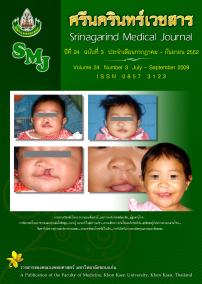ThaiScience
ThaiScience
SRINAGARIND MEDICAL JOURNAL
Volume 35, No. 05, Month SEPTEMBER, Year 2020, Pages 639 - 648
Screening and management for latent tuberculosis infection (ltbi) in household contacts
Jatuporn Wanchaitanawong, Wipa Reechaipichitkul, Apichart So-ngern
Abstract Download PDF
Tuberculosis (TB) remains the global health problem and the most common cause of death among communicable diseases. Household contacts with active pulmonary TB patients have a chance to develop active TB disease or latent tuberculosis infection (LTBI) more than general population. Contact cases who have fever, cough, weight loss should be investigated for active TB disease by chest radiograph and sputum acid fast bacilli (AFB) staining. Contact cases who have no symptoms, normal chest radiograph and negative sputum AFB smear should be further investigated for LTBI by tuberculin skin test (TST) or interferon- gamma release assay (IGRA). Household contacts who have LTBI are at risk of progression to TB disease especially in young children and immunocompromised host. Recommended regimen for LTBI treatment included: 6 months of daily isoniazid monotherapy, 3-4 months of daily rifampicin monotherapy, 3-4 months of daily rifampicin plus isoniazid, and 3 months of weekly rifapentine plus isoniazid. The shorten regimens have noninferiority efficacy compared with 6 months of daily isoniazid monotherapy, but have much better compliance and completed treatment. Therefore, the early detection and treatment of LTBI in household contact with pulmonary TB patients is crucial to reduce the risk of developing active TB disease and impact of decreasing incidence of global TB infection.
Keywords
Latent tuberculosis infection Household contactsSRINAGARIND MEDICAL JOURNAL
Published by : Faculty of Medicine, Khon Kaen University
Contributions welcome at : http://www.smj.ejnal.com/e-journal/journal/index.php
